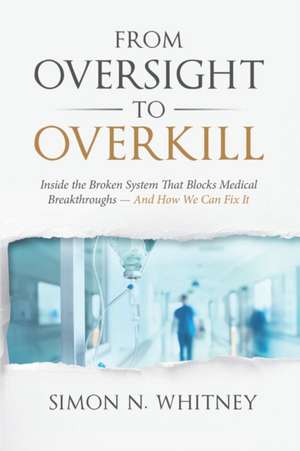From Oversight to Overkill
Autor Simon N. Whitneyen Limba Engleză Paperback – 4 apr 2023
| Toate formatele și edițiile | Preț | Express |
|---|---|---|
| Paperback (1) | 132.41 lei 3-5 săpt. | |
| Rivertowns Books – 4 apr 2023 | 132.41 lei 3-5 săpt. | |
| Hardback (1) | 196.64 lei 3-5 săpt. | |
| Rivertowns Books – 3 apr 2023 | 196.64 lei 3-5 săpt. |
Preț: 132.41 lei
Nou
Puncte Express: 199
Preț estimativ în valută:
25.34€ • 26.28$ • 21.13£
25.34€ • 26.28$ • 21.13£
Carte disponibilă
Livrare economică 06-20 martie
Preluare comenzi: 021 569.72.76
Specificații
ISBN-13: 9781953943224
ISBN-10: 1953943225
Pagini: 318
Dimensiuni: 152 x 229 x 19 mm
Greutate: 0.52 kg
Editura: Rivertowns Books
ISBN-10: 1953943225
Pagini: 318
Dimensiuni: 152 x 229 x 19 mm
Greutate: 0.52 kg
Editura: Rivertowns Books
Notă biografică
Simon Whitney, MD, JD opened his family practice in rural Washington state in 1982. In 1995, his career took a sharp turn when he enlisted at Stanford Law School. He wanted to study and write about medical ethics, and for this a medical degree alone might not be enough. At Stanford, he earned a degree from the law school, and also did a fellowship at the Stanford Center for Biomedical Ethics. In order to understand the place of ethics in the world, he served on the university's Institutional Review Board, which is charged with reviewing proposed research to make sure it does not abuse human subjects. In 1999, Dr. Whitney accepted a faculty position at Baylor College of Medicine in Houston, Texas, which he held until 2022. He had dual responsibilities at Baylor-to see patients in the family medicine clinic, and to do original work in medical ethics. As he helped the scientists who were his new colleagues, he discovered the many problems with IRB review, and he began publishing papers proposing reform. Whitney's view that the IRB system needs a major overhaul was unpopular among ethicists, and he sometimes struggled to get his papers published. But scientists were grateful that someone understood their difficulties. At the end of a talk at the MD Anderson Cancer Center, when Whitney asked if there were any questions. Emil Freireich, a pioneering oncologist who had made breakthrough discoveries in the treatment of childhood cancer, asked simply "How can I help?" Other scientists have been equally enthusiastic. In 2012, Whitney published an essay pointing out that IRB review had led, unintentionally but predictably, to lopsided enrollment in a study of the use of oxygen in the neonatal intensive care unit, leading to treatment recommendations that would apply less well to disadvantaged children. The article persuaded many scientists, but ethicists reacted with anger (one wrote that Whitney was part of a "recent wave of reactionary attacks" that is "at best ahistorical and at worse blindly hysterical"). Over time, Whitney realized that the system would never be changed by academic debate. As a first step, in 2016 he published BALANCED ETHICS REVIEW (Springer), a manual for IRB members that showed how their oversight could be less harmful to the work of scientists. Now, his new book-FROM OVERSIGHT T OVERKILL-takes the debate over the IRB system's suppression of research into the public arena. It will enable readers with an interest in how science works, and how government action can harm the public interest, to learn the whole story and decide for themselves what should be done next.
